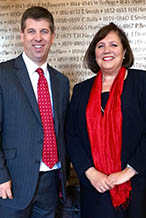Law Society President hails "crucial role" played by local government solicitors
 The Law Society President has praised the “crucial role” that solicitors in local government play in helping towns and cities flourish.
The Law Society President has praised the “crucial role” that solicitors in local government play in helping towns and cities flourish.
Jonathan Smithers also said it was essential that in-house regulation of the sector was “responsive to the market needs, proportionate and effective otherwise it inadvertently places local government solicitors on the back foot”.
The President was speaking at a roundtable of local government solicitors held to mark the launch of the 3C shared legal service, the constituent councils for which are Cambridge City Council, Huntingdonshire District Council and South Cambridgeshire District Council.
Smithers acknowledged that local government solicitors faced many challenges such as significant cuts to income, pressures to deliver better services and radical efficiency measures.
He said: “The tough economic climate has affected solicitors both in-house and in private practice. We all have had to adapt to the difficult market circumstances to have a viable future. Innovation, new ways of working and forward planning have been essential to future proof our businesses.
“Local government has explored different options to address these challenges. Business models such as shared legal services and alternative business structures (ABSs) have been recently used by local government to boost solicitors’ entrepreneurial spirits and cater for the demands of local communities.”
He noted that shared services such as 3C could bring benefits “such as reducing overheads, driving down costs and promoting integration with neighbouring local authorities” as well as the potential for income generation. The latter had, however, raised concerns about levels of staffing and resource.
The Law Society President also pointed to how some local authorities had moved to set up alternative business structures.
“The main benefits of ABSs for local government are the ability to offer more legal services to wider clientele, as well as diversification and innovation at strategic and operational levels. ABSs can be tailored in a way that meets the demands of the local economy and population,” he argued.
But Smithers accepted that the ABS option did have its challenges, with some applicants indicating that the licensing process and set up was burdensome. “Similarly, the long-term benefits of these types of ABSs for local government are yet to be seen.”
On regulation of the sector, the President said: “It is a known fact that the Solicitor Regulation Authority is still playing catch-up with emerging business models. Rule 4 of the Practice Framework Rules (PFRs) is no longer suitable for local government solicitors who are willing to innovate, either through shared legal services or through ABSs.”
Smithers said that for the legal services market to be balanced, the same regulatory requirements needed to be applied to all competitors in the market. He noted the SRA’s announcement that changes to the rules would take place in 2016, and the Legal Services Board’s consultation on in-house services in February.
The Law Society President suggested that the PFRs would part of the first tranche of the SRA’s review on the SRA Handbook. A consultation on the details is due at Easter next year.
“It is essential that in-house regulation in this sector is responsive to the market needs, proportionate and effective otherwise it inadvertently places local government solicitors on the back foot,” he argued.
On Chancery Lane’s relationship with local government, Smithers highlighted the fact that lawyers from Oxfordshire County Council, Gateshead Council and Lincolnshire County Council were members of the Society’s newly-created in-house committee.
He acknowledged that in the past the in-house division of the Law Society had been traditionally associated with in-house corporate solicitors, but insisted that this was no longer the case.
The local government members of the committee were there to make sure the particular needs and views of the sector’s solicitors were represented and promoted as part of the in-house community. The President also called on local government solicitors to get involved in the committee’s work.
Maria Memoli, Law Society Council Member for Local Government and the Implementation Manager for the 3C project, said: “I was delighted Jonathan, our Law Society President, was able to join us in the inauguration of the 3C shared legal service combining the three legal departments of Cambridge City Council, South Cambridgeshire District Council and Huntingdonshire District Council.”
Memoli (pictured with the President), Associate of IESE, added: “The roundtable discussions were well received by all and there was good participation reflecting on what the future holds for solicitors and lawyers generally within local government.
“There’s plenty of work still to do, and more challenges to face – but it’s all going in the right direction.”
The roundtable was held at the Guildhall in Cambridge and attended by Alex Colyer, Director South Cambridgeshire DC, and Julie Slatter, Director of Huntingdonshire DC, as well as members of the shared legal service.
